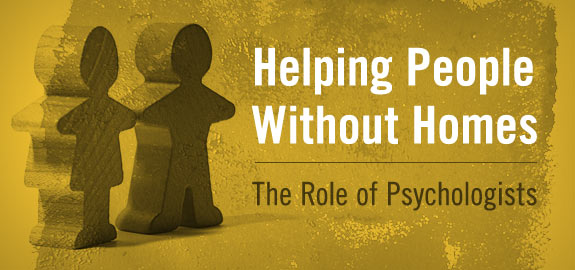The 2009 APA Presidential Task Force on Psychology’s Contribution to End Homelessness recently published, “Helping People Without Homes: The Role of Psychologists and Recommendations to Advance Training, Research, Practice and Policy.” The report reinforces that the availability of affordable housing for low-income individuals reduces homelessness and addresses the importance of support to people most vulnerable for losing their homes.
The 2009 APA Presidential Task Force on Psychology’s Contribution to End Homelessness recently published, Helping People Without Homes: The Role of Psychologists and Recommendations to Advance Training, Research, Practice and Policy. The report presents research findings related to the psychosocial stressors associated with homelessness in adults, families, and youth. It also discusses best practices to support individuals who are currently experiencing, or at risk of, homelessness. The report is a personal and professional call to action for psychologists to engage in a wide range of efforts to end homelessness. Among its recommendations, the Task Force calls for culturally competent assessments, strengths-based and community-focused clinical practices, and activism at state, local and federal levels. In each of these endeavors, the report underscores the importance of collaborations across disciplines and with key stakeholders and consumers.
As a clinical volunteer in Houston, the president of the American Psychological Association (APA), James Bray, Ph.D., witnessed the impact of homelessness on individuals and communities. He was committed to doing more. Dr. Bray commissioned a seven-member Task Force on Psychology’s Contribution to End Homelessness in 2009. The Task Force members included clinicians, researchers, and community psychologists from across the United States with a range of expertise in working with individuals without homes.
Their mission was to identify scientific understanding of the psychosocial stressors, including poverty, associated with homelessness. The Task Force completed an extensive review of research related to homelessness. Based on that research, they met with Capitol Hill legislators to bring attention to the mental health concerns of people without homes. The group contributed input to the U.S. Interagency Council on Homelessness’s Federal Strategic Plan to End Homelessness. The Task Force advocated for legislation promoting rapid re-housing, health care reform, and other targeted social services. They also held meetings with government agencies and non-profit organizations to promote collaboration between government and non-government groups. In May 2010, a Congressional briefing was held that presented the Task Force’s findings and recommendations.
The Task Force also wanted to understand the current parameters of psychologists’ involvement with individuals experiencing homelessness. They conducted a survey of the 150,000 APA members to understand this involvement.
The Task Force’s findings demonstrate that the availability of affordable and safe housing for low-income individuals reduces homelessness. They addressed the importance of providing ongoing support to those persons most vulnerable for losing their homes. Eradicating homelessness requires the creativity, skill, and commitment of diverse people, organizations, and professions.

